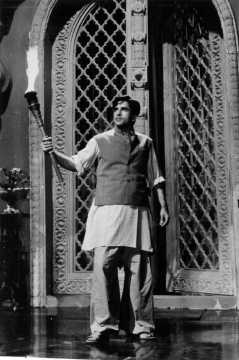Actors wear monikers and nicknames proudly, like status symbols. But not all nicknames are good. Ask Shashi 'Taxi' Kapoor.
A 'Taxi' named Shashi Kapoor
Mumbai - 18 Mar 2016 16:29 IST
Updated : 05 Dec 2017 1:35 IST


Shriram Iyengar
Shashi Kapoor was certainly born with many advantages. A scion of the blue-blooded Kapoor khandaan, he was blessed with the looks of a matinee idol. Those were credentials enough for a career as a Hindi film star. But in a family that boasted of three stars — father Prithviraj and brothers Raj and Shammi — Shashi knew he would have to do more than simply show up to establish a career.
In this determination, apart from looks, Shashi Kapoor was a likeness of his father. Unlike his brothers, who only worked in theatre as an internship for cinema, Shashi forged his acting and his life in the crucible of Prithvi Theatres. Theatre repaid the debt by introducing him to his wife and love — Jennifer Kendal. It was on the foundation of theatre that Shashi Kapoor built his family, which later expanded to include that venerable institution, Prithvi theatre.

If theatre was his love, films were work. After making his debut in Yash Chopra's Dharmputra (1961), Shashi Kapoor found the going tough. His next four films — Char Diwari (1961), Mehndi Lagi Mere Haath (1962), Prem Patra (1962) and Benazir (1962) — found no takers. It was another Chopra hit, BR Chopra's Waqt (1965), that earned him the first hit of his career.
The rest of the 1960s were spent balancing independent projects like Merchant-Ivory's The Householder (1963), Shakespearewallah (1965) and Bombay Talkie (1970) alongside typical Hindi masala fare like Jab Jab Phool Khile (1965), Pyar Kiye Jaa (1966) and Pyar Ka Mausam (1968). It was this double life that demands respect for its versatility and professionalism.
An astute professional, Shashi Kapoor was known for his punctuality, egalitarian nature and charm. Even when he turned producer, he refused to be cowed down by the arithmetic of the business. He reputedly housed all his crew — actors and technicians — in five-star accommodation.
The money to do all this did not come easily. To fund his independent films, Shashi Kapoor would sign films left, right and centre, without any consideration for his image. In the 1970s, he was often cast as Amitabh Bachchan's 'sidekick', though his performances make the nickname seem contradictory. It was this tendency of his, to sign any film that came his way, that made older brother Raj Kapoor throw his hands up in frustration.

The story goes that Shashi Kapoor was working almost round the clock during the filming of Raj Kapoor's Satyam Shivam Sundaram (1978). Before filming began, Raj Kapoor was unable to get Shashi Kapoor to agree on dates for the film. In Madhu Jain's book The Kapoors, Shashi Kapoor narrates the incident: 'He [Raj Kapoor] asked me how much money I would take. I cried and touched his feet, and he said, "Bade log ho gaye. Aap ki dates mushkil se milti hain [You have become a big star. Your dates are difficult to get]".'
Not wanting to anger his elder brother, Shashi Kapoor immediately asked Raj Kapoor to pick any dates he wanted from the actor's diary. It was a costly mistake that would annoy other producers. Still, that was not the end of the issue.
Raj Kapoor was struggling with several things during the filming of Satyam Shivam Sundaram. Lata Mangeshkar had got into a tiff with the filmmaker regarding her compensation. Zeenat Aman was increasingly looking like a bad choice for a village belle. This frustration boiled over with Shashi Kapoor's cut-to-cut appearances at the shooting.
In his defence, the actor was juggling multiple projects and had no time to spare. Hearing his younger brother's condition, Raj Kapoor remarked, 'Shashi Kapoor saheb, aap taxi ban gaye hain.' The remark would have gone unnoticed but for the megaphone in the director's hands.
The moniker stuck. But Shashi Kapoor turned it to his benefit. A genial, charming, generous man, he never turned down anyone, friend or stranger, in their moment of need. And his struggle to make meaningful cinema also found resolution. With the launch of Film Valas, his home banner, the actor gained the independence he craved. Films like Junoon (1978), Kalyug (1981), and New Delhi Times (1986) were evidence of his keen cinematic sense.


